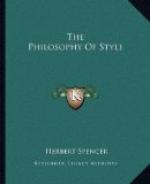ii. Economy in the Use of Words.
5. The greater forcibleness of Saxon English, or rather non-Latin English, first claims our attention. The several special reasons assignable for this may all be reduced to the general reason—economy. The most important of them is early association. A child’s vocabulary is almost wholly Saxon. He says, I have, not I possess—–I wish, not I desire; he does not reflect, he thinks; he does not beg for amusement, but for play; he calls things nice or nasty, not pleasant or disagreeable. The synonyms which he learns in after years, never become so closely, so organically connected with the ideas signified, as do these original words used in childhood; and hence the association remains less strong. But in what does a strong association between a word and an idea differ from a weak one? Simply in the greater ease and rapidity of the suggestive action. It can be in nothing else. Both of two words, if they be strictly synonymous, eventually call up the same image. The expression—It is acid, must in the end give rise to the same thought as—It is sour; but because the term acid was learnt later in life, and has not been so often followed by the thought symbolized, it does not so readily arouse that thought as the term sour. If we remember how slowly and with what labour the appropriate ideas follow unfamiliar words in another language, and how increasing familiarity with such words brings greater rapidity and ease of comprehension; and if we consider that the same process must have gone on with the words of our mother tongue from childhood upwards, we shall clearly see that the earliest learnt and oftenest used words, will, other things equal, call up images with less loss of time and energy than their later learnt synonyms.
6. The further superiority possessed by Saxon English in its comparative brevity, obviously comes under the same generalization. If it be an advantage to express an idea in the smallest number of words, then will it be an advantage to express it in the smallest number of syllables. If circuitous phrases and needless expletives distract the attention and diminish the strength of the impression produced, then do surplus articulations do so. A certain effort, though commonly an inappreciable one, must be required to recognize every vowel and consonant. If, as all know, it is tiresome to listen to an indistinct speaker, or read a badly-written manuscript; and if, as we cannot doubt, the fatigue is a cumulative result of the attention needed to catch successive syllables; it follows that attention is in such cases absorbed by each syllable. And if this be true when the syllables are difficult of recognition, it will also be true, though in a less degree, when the recognition of them is easy. Hence, the shortness of Saxon words becomes a reason for their greater force.




